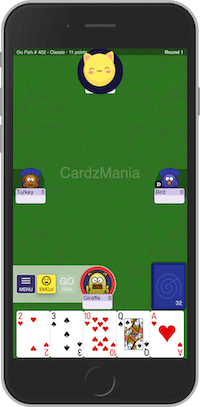Overview
Go Fish is a classic game where players try to match up cards by asking other players for cards in their hand. Go Fish is very popular among kids and can be played with 2 to 12 players.
Play Multiplayer Go Fish Online
The Deck and the Deal
Go Fish is played with a standard deck of 52 cards. For 2 to 3 players, the dealer passes out seven cards one by one to each person. For 4 to 8 players, the dealer passes out five cards. For 9 to 10 players, the dealer passes out four cards. For 11 to 12 players, the dealer passes out three cards. After the deal, the remainder of the deck is placed in the center of the gameplay area. If using two decks, the dealer distributes seven cards each with 2 to 3 players and five cards each with more than 3 players.
Traditionally, Go Fish is played with a special deck where players match pictures instead of numbers.
How to Play
Beginning with the player left of the dealer and going clockwise, players ask another player if they have a certain kind of card. If the asked player does have that certain kind of card, they must give the asking player all of the cards with that value. If the asked player does not have the requested kind of card, then the asked player says 'Go Fish' and the asking player goes fishing in the deck by drawing a card. If they luckily fished the same card they requested, they retain their turn and request another card.
As play like this continues, players try to make four of a kinds, or books, in their hand. When a player makes a book, they place the matching cards in a pile face up in front of them.
If players run out of cards, then they draw one from the deck. If there is no deck remaining, they are out of play and wait for others to finish their hand.
Scoring
Players score points for the amount of books they make.
Winning
Each round ends when all 13 books are made. The game ends when one of the players reaches the predetermined points. The player with the highest points wins the game.
Variations
CardzMania supports several customizable rules and options so you can play Go Fish exactly how you like or how you grew up playing with your friends and family. In addition to the classic way of playing, we often have new creative options for you to try to spice up the game if you are interested in trying different spins for fun.
Points
Players determine a set amount of points when the game ends.
Rounds
Players determine a set amount of rounds (also known as hands or deals) that the game will go to (instead of the points selection above).
Timer
Players only have a set amount of time to make their turn after which a turn is automatically played for them and the game proceeds: Fast is 7 seconds, Standard is 15 seconds, Slow is 30 seconds, and Very Slow is 60 seconds. Players can also choose to disable the timer, but that is only for private tables.
Scoring Method
Players can determine if each book is worth 1 point or if books are worth their pip value, e.g. a book of 2s is worth 2 points and a book of aces is worth 14 points.
Double Deck
Players can determine if they want to play with two decks or 104 cards. In this variation, books require 8 cards of the same value.
Classic Basics
Classic games vary to a great degree in terms of rules and objectives. A thread that binds them all is their simplicity and age. Classic games are typically easy enough for young children to play them and have typically been around for many years.
Card Game Basics
A deck of cards consists of 52 cards, with 4 distinctive subgroups. Each of these subgroups is recognised by a symbol and are referred to as suits. They consist of Clubs, Spades, Hearts and Diamonds. Each suit contains 13 cards which, generally, are considered in this order, Ace (A), 2, 3, 4, 5, 6, 7, 8, 9, 10, Jacks (J), Queen (Q) and King (K). Some games include the two Jokers found in a standard deck but most games don't.
Feedback
Would like to discuss new features or variations for Go Fish? Need a custom rule? Have a question? Got a suggestion? Don't see a game you want to play? Please contact us by
email, facebook or twitter - we really value your feedback and love hearing from all of you!
This site uses cookies. By continuing to browse the site you are agreeing to our use of cookies.




